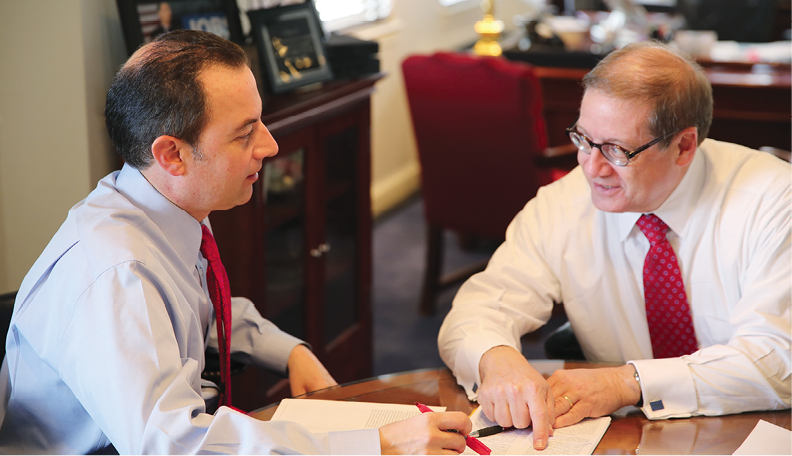
John Ryder’s love of politics started in high school, when he became fascinated with how government systems work. That fascination has continued over the decades, leading the Memphis lawyer to his current role as the general counsel of the Republican National Committee. “We are fallible human beings,” he says. “James Madison said in the Federalist Papers that if men were angels, we would need no government. So we must conduct our government through the political process.”
During law school, Ryder remembers watching the Watergate scandal unfold on the television in the student lounge. He returned to his hometown of Memphis after earning his law degree in 1974. His practice has focused on bankruptcy, workouts, commercial litigation and election law. He has been a partner at Harris Shelton Hanover Walsh since 2000.
His commitment to the Republican Party runs deep, spanning four decades. Ryder chaired the GOP’s national reapportionment efforts after the 2010 census, and he has logged 13 years with the RNC as a national committeeman. He served as schedule chairman for RNC presidential nominations at the GOP’s 2012 convention in Tampa, where he was also involved in attempts to resolve differences between the GOP platform committee and delegates loyal to Ron Paul. Over the years, he has also held numerous Shelby County posts and been involved in state redistricting and election law.
Last spring, Ryder was tapped to serve the RNC as its general counsel. The volunteer position, which officially began in April 2013, is a major commitment. Ryder spends a few days each month in the nation’s capital, advising RNC Chair Reince Priebus and directing the party’s full-time legal staff. His focus is on rules relating to presidential primaries and campaign finance laws. “Rules issues take a fair amount of time. We are examining the rules related to the conduct of presidential primaries—their timing, the conventions, debates,” Ryder said. “We are defining the playing field. The RNC sets rules, and then you have other actors—state legislatures, state parties, candidates—who respond to those rules. It’s like thinking 16 moves ahead in a chess match.”
Ryder hails from East Memphis, a bastion of Republicanism surrounded by a sea of blue districts. In fact, the 9th District, representing the western part of Memphis, is considered one of the most Democratic districts in the South. He sees the deep political divide in his hometown as a microcosm of what’s happening in politics nationally. “Madison described the concept of factions: small groups opposed to the whole,” Ryder explained. “People confuse factions with political parties. Parties are coalitions. By bringing factions into the tent of the party, the factions’ views are moderated by the party’s long-term interests. Campaign finance laws force factions out of the party coalitions, where their interests are not moderated by the party, which increases the rancor of current politics. We have to re-examine the way we are regulating money in politics. I consider most campaign finance regulation as an expenditure of legal effort to no good purpose. It’s the hydraulic effect of political funding—the money will find a way.”
What does he see as a possible solution? “Unlimited contributions with instant disclosure on the Internet,” he said. “Total transparency. No limits, because people will get around them. Everyone needs to know who is getting what from whom.”
Looking back at his years of hard work supporting the RNC and GOP candidates, Ryder is satisfied with the process. “Working to impact the way the government works is way more interesting than I ever thought it would be when I was in high school,” he said. “When you’re involved in national politics, you’re on a very big stage.”